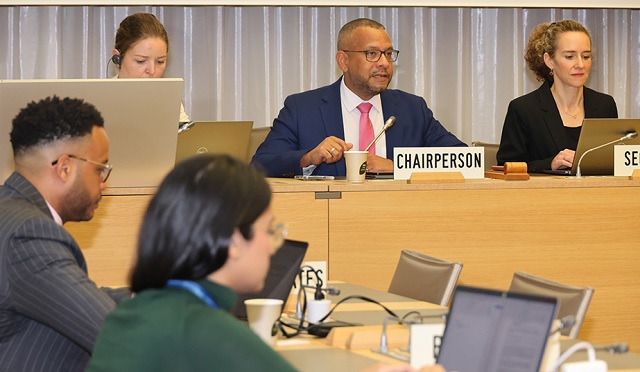El grupo encargado de las pequeñas empresas sigue adelante con su programa de trabajo
El Grupo de Trabajo Informal sobre las Pequeñas Empresas prosiguió los debates en el marco de su programa de trabajo.

El 18 de octubre, el Grupo de Trabajo Informal sobre las Microempresas y las Pequeñas y Medianas Empresas (Mipymes) prosiguió los debates en el marco de su programa de trabajo, centrándose en la función que desempeñan las organizaciones de apoyo a las empresas para ayudar a las pequeñas empresas a participar en el comercio internacional. En la reunión, los ganadores de la iniciativa Campeones de las Pequeñas Empresas presentaron exposiciones y se destacó también el éxito de una pequeña empresa.
Thematic discussions: Business support organizations
The meeting shed light on the work of business support organizations, such as the Enterprise Europe Network (EEN) and the International Trade Centre, in connecting small businesses with partners to help them export to international markets and utilise opportunities provided by free trade agreements.
It was noted that business support organizations play an important role in facilitating the information flow between the public and private sectors, particularly small business, in addition to gathering feedback and providing advisory services to MSMEs to help them access financing opportunities.
The session was in response to a proposal by the United States (INF/MSME/W/51), which suggested exploring how small businesses are linked to the mechanisms that shape trade policy through local chambers of commerce, trade associations, and/or other local business support organizations.
Success stories
As part of its efforts to strengthen engagement with the private sector, the Group invited Mr Aziz Ndiaye, Founder and Owner of ANEP Company, a small business headquartered in Switzerland, to present his enterprise. ANEP Company specializes in the import and export of exotic fruits and vegetables from Senegal, Côte d’Ivoire, Burkina Faso, Togo and Benin and seeks to deliver positive social impact for the communities benefiting from these trade opportunities.
The two winners of the Small Business Champions initiative (CLAC – Coordinadora Latino americana de Comercio Justo and O’KANATA) presented their winning projects to the Group. Their projects are aimed at helping indigenous people trade internationally through needs assessment surveys, technical assistance and online platforms.
Dr Ayman El Tarabishy, President and CEO of the International Council for Small Business (ICSB), spoke to the Group about the ICSB’s efforts to advance small business research and good practice.
Future work
The Group’s next meeting on 10 December will focus on good regulatory practices for MSMEs and trade digitalization in response to a proposal put forward by the United Kingdom (INF/MSME/W/52).
The UK will explain how MSMEs’ interests are considered in regulatory development, referencing Annex 4 of the December 2020 MSME package. The UK will also discuss various processes and tools used in domestic regulatory procedures that may benefit MSMEs. Various speakers will be invited to talk about the importance of trade digitalization for small businesses and how trade digitalization efforts can be accelerated.
Work is underway to build on the compendium of special provisions on the integration of MSMEs into Authorised Economic Operators programmes published earlier this year. A joint study by the World Customs Organization, the International Chamber of Commerce and the Informal working Group on MSMEs is being prepared on this issue, using a recent survey as a basis for the report.
New proposal
The Russian Federation presented a proposal (INF/MSME/W/58 – INF/TGE/COM/10) to have a compendium of educational programmes aimed at empowering women entrepreneurs in finance and marketing. The compendium’s objective is to help women-owned businesses participate in international trade and assist governments in drafting supporting policies.
Updates
Members shared updates on their implementation of the December 2020 MSME package of recommendations aimed at helping small businesses trade globally. China reported on its ninth Trade Policy Review (TPR), where measures taken to integrate small and medium-sized enterprises (SMEs) in its policies were included in its report. Such measures include the provision of policy support documents, tax extensions and the establishment of funds.
China also highlighted its efforts to create a business-friendly environment, such as addressing financing challenges and supporting research and development.
The ITC provided updates on the Global Trade Helpdesk, an online platform intended to bring together trade and business information for companies, especially MSMEs. The ITC noted an increase in the usage of the platform in the United States, India, China and Indonesia, and highlighted recent events including the launch of Bahasa and Chinese versions of the HelpDesk.
MSME-related discussions in the Technical Barriers to Trade Committee and Government Procurement Committee were also shared with the Group. This included a new good practice guide on how to comment on members’ notifications, focusing on the ability of the private sector to provide feedback and track such notifications and on the adoption of a best practice report on measures facilitating the participation of SMEs in government procurement.
















